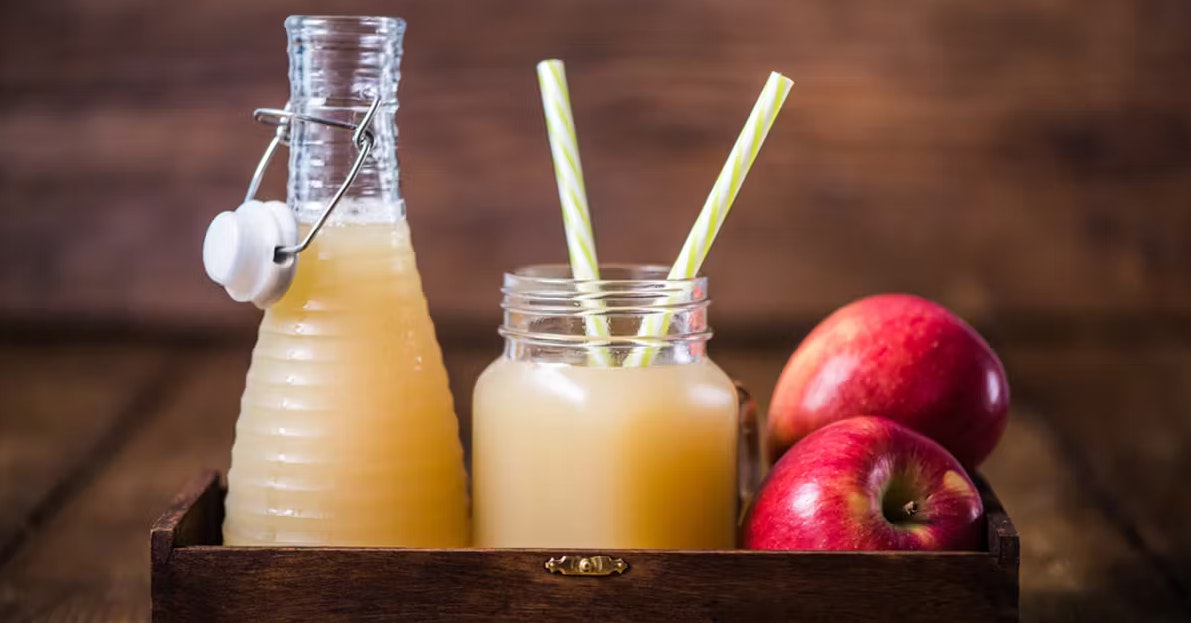No, apple juice does not contain protein. This holds true for both pasteurized commercial juice and cold-pressed apple juice.
Protein plays an important role in overall health, but you will not get it from apple juice. Apple juice has a lot of other health benefits, though, which you shouldn't miss out on.
In this article, we'll delve into those benefits and also explore which other fruit juices do contain some protein.
Health Benefits of Drinking Apple Juice
Apart from its awesome taste, apple juice offers many potential health benefits. It can play a significant role as a part of a balanced diet.
Please note that the benefits listed here apply to 100% pure, cold-pressed apple juice. Most commercially produced apple juice is pasteurized, a process that involves high temperatures that destroy most nutrients. Furthermore, they typically contain added sugars and various additives, while they lack fiber.
- Nutrient-Rich: Apple juice is a good source of various essential nutrients, including vitamin C, potassium, and different antioxidants. These nutrients promote overall wellness, boost the immune system, and aid in sustaining bodily functions.
- Antioxidants: Apples are rich in antioxidants, such as quercetin and catechins, which can help protect cells from oxidative damage and reduce the risk of chronic diseases. When compared to many other commonly consumed fruits in the United States, apples had the second-highest level of antioxidant activity.
- Hydration: Apple juice is primarily composed of water, in fact, it is 88% water, making it an excellent hydrating beverage. Staying well-hydrated is crucial for overall health and well-being.
- Digestive Health: The dietary fiber in apple juice, while lower than in whole apples, can still contribute to digestive health by promoting regular bowel movements and preventing constipation.
- Heart Health: Some studies suggest that drinking apple juice may be associated with a reduced risk of heart disease due to its potential to lower LDL cholesterol levels and blood pressure.
- Protects the Brain: Apple juice has been proven to protect the brain’s neurotransmitters, which are nerve cells that transmit messages to other cells in the body. One study found that drinking apple juice reduced the production of beta-amyloid in mice and another found that drinking apple juice regularly could reduce the risk of Alzheimer’s by as much as 75%.
- Weight Management: Apple juice can be a lower-calorie alternative to sugary sodas and other high-calorie beverages. Choosing apple juice without added sugars can support weight management. It's important to keep consumption of apple juice moderate because its natural sugar content can make it calorie-dense. Excessive consumption of apple juices, even if it is 100% pure, can lead to excessive calorie intake and may contribute to weight gain and blood sugar spikes.
- Improved Bone Health: Apple juice contains a unique phytonutrient called phloridzin that helps build bones. This flavonoid antioxidant is only found in apples and can help improve bone density and reduce bone breakdown in women after menopause. However, most of the good stuff is in the peels, so don't strain out all the pulp.
The Importance of Protein
Protein plays a vital role in health and wellness. It is especially popular among strength builders and fitness enthusiasts because it helps build muscle, but when consumed at moderate to high levels, protein can help you lose weight.
The USDA Dietary Guidelines say that adult women should eat 1.6 ounces (46 grams) of protein per day and men should eat 1.8 ounces to 2 ounces (46 grams to 56 grams) of protein per day.
Protein-Rich Juice Options
If you're looking to increase your protein intake through food sources, you'll need to consider other foods like meat, dairy, legumes, or other sources.
However, there are some fruits with a higher protein count than you might expect. These include:
1. Guava (0.14 oz or 4 grams of protein per 8-oz cup of fruit)
Guavas are tropical treats with just about the highest protein content in fruits you’ll find. They are naturally sweet and also rich in vitamin C and fiber, especially if you include the skin and seeds when you juice guavas.
2. Jackfruit (0.1 oz or 3 grams protein per 8-oz cup of fruit)
Jackfruit is another tropical fruit, and it’s related to figs. The texture of the jackfruit’s unripe flesh is very similar to pulled pork. Along with its high protein content, jackfruit is also loaded with other healthy nutrients like fiber, potassium, vitamins A and C, calcium, magnesium, riboflavin, and iron.
3. Avocado (0.1 oz or 3 grams protein per 8-oz cup of fruit)
Avocados are well-known for being an excellent source of healthy fats, but you might not have known that they are also rich in protein. Avocados are also rich in vitamins C, E and K, fiber, magnesium, folate, riboflavin, and niacin.
4. Kiwi (0.07 oz or 2 grams protein per 8-oz cup of fruit)
Kiwi juice can enhance the vitamin C and potassium benefits of apple juice, while also adding healthy loads of iron and phosphorus.
5. Blackberries (0.07 oz or 2 grams protein per 8-oz cup of fruit)
Along with the protein in blackberries, they also contain loads of fiber. Furthermore, these beauties have nearly half of the vitamin C recommended as a daily requirement, and high levels of brain-boosting polyphenols and antioxidants.
6. Apricot (0.07 oz or 2 grams protein per 8-oz cup of fruit)
This stone fruit, in its natural fresh form, is not only a good protein source, but it also contains potassium and fiber in the skin and flesh can boost digestion. Furthermore, apricots contain vitamins A, C and E for skin and eye health.
7. Bananas (0.06 oz or 1.6 grams protein per 8-oz cup of fruit)
Bananas are known for their high potassium content, but not for their protein content. They are also a good source of fiber, vitamins A, C, and B6, prebiotics, and magnesium.
8. Cherries (0.06 oz or 1.6 grams protein per 8-oz cup of fruit)
Cherries are a potent source of potassium, which is valuable for blood pressure regulation, and maintaining proper muscle function. Cherries also boost restful sleep because they contain melatonin.
9. Grapefruit (0.05 oz or 1.3 grams protein per 8-oz cup of fruit)
Along with its low-calorie benefits, grapefruit also contains protein, vitamin C, iron, calcium, and citric acid that may prevent kidney stones.
And if you like a nutty twist, adding a spoonful of natural peanut butter to your apple juice can boost its protein content significantly. Peanut butter also provides healthy fats for satiety.
Conclusion
We have established that apple juice does not contain protein. To meet your protein needs while still enjoying the refreshing taste of apple juice, you may want to make a smoothie with plant-based proteins (such as pea protein).
Remember to customize your combinations to suit your taste preferences and dietary requirements while ensuring you're meeting your protein goals.


Comment